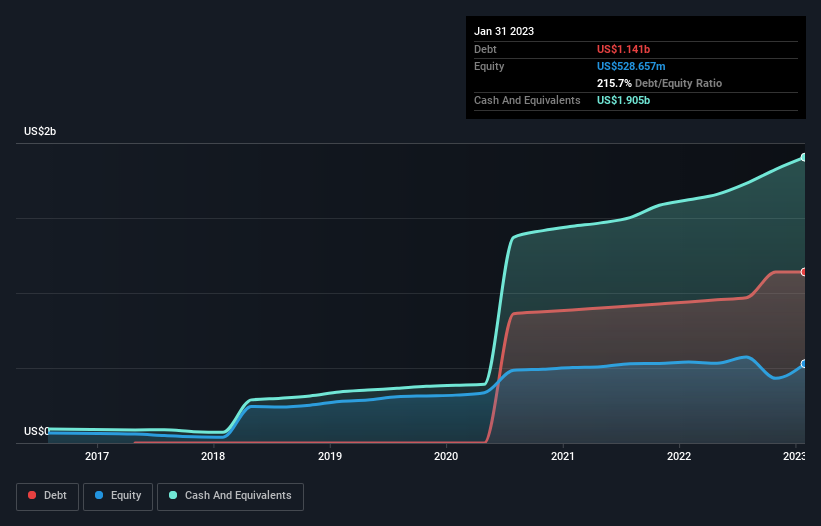
David Iben put it well when he said, 'Volatility is not a risk we care about. What we care about is avoiding the permanent loss of capital.' So it seems the smart money knows that debt - which is usually involved in bankruptcies - is a very important factor, when you assess how risky a company is. We note that Zscaler, Inc. (NASDAQ:ZS) does have debt on its balance sheet. But is this debt a concern to shareholders?
When Is Debt Dangerous?
Debt is a tool to help businesses grow, but if a business is incapable of paying off its lenders, then it exists at their mercy. Ultimately, if the company can't fulfill its legal obligations to repay debt, shareholders could walk away with nothing. However, a more usual (but still expensive) situation is where a company must dilute shareholders at a cheap share price simply to get debt under control. Of course, the upside of debt is that it often represents cheap capital, especially when it replaces dilution in a company with the ability to reinvest at high rates of return. The first step when considering a company's debt levels is to consider its cash and debt together.
See our latest analysis for Zscaler
How Much Debt Does Zscaler Carry?
You can click the graphic below for the historical numbers, but it shows that as of January 2023 Zscaler had US$1.14b of debt, an increase on US$940.7m, over one year. However, its balance sheet shows it holds US$1.91b in cash, so it actually has US$764.8m net cash.

How Strong Is Zscaler's Balance Sheet?
We can see from the most recent balance sheet that Zscaler had liabilities of US$1.20b falling due within a year, and liabilities of US$1.31b due beyond that. Offsetting these obligations, it had cash of US$1.91b as well as receivables valued at US$360.3m due within 12 months. So it has liabilities totalling US$245.6m more than its cash and near-term receivables, combined.
Having regard to Zscaler's size, it seems that its liquid assets are well balanced with its total liabilities. So it's very unlikely that the US$13.1b company is short on cash, but still worth keeping an eye on the balance sheet. While it does have liabilities worth noting, Zscaler also has more cash than debt, so we're pretty confident it can manage its debt safely. The balance sheet is clearly the area to focus on when you are analysing debt. But it is future earnings, more than anything, that will determine Zscaler's ability to maintain a healthy balance sheet going forward. So if you're focused on the future you can check out this free report showing analyst profit forecasts.
Over 12 months, Zscaler reported revenue of US$1.3b, which is a gain of 57%, although it did not report any earnings before interest and tax. Shareholders probably have their fingers crossed that it can grow its way to profits.
So How Risky Is Zscaler?
Although Zscaler had an earnings before interest and tax (EBIT) loss over the last twelve months, it generated positive free cash flow of US$277m. So taking that on face value, and considering the net cash situation, we don't think that the stock is too risky in the near term. One positive is that Zscaler is growing revenue apace, which makes it easier to sell a growth story and raise capital if need be. But we still think it's somewhat risky. When analysing debt levels, the balance sheet is the obvious place to start. However, not all investment risk resides within the balance sheet - far from it. These risks can be hard to spot. Every company has them, and we've spotted 3 warning signs for Zscaler you should know about.
If you're interested in investing in businesses that can grow profits without the burden of debt, then check out this free list of growing businesses that have net cash on the balance sheet.
Valuation is complex, but we're here to simplify it.
Discover if Zscaler might be undervalued or overvalued with our detailed analysis, featuring fair value estimates, potential risks, dividends, insider trades, and its financial condition.
Access Free AnalysisHave feedback on this article? Concerned about the content? Get in touch with us directly. Alternatively, email editorial-team (at) simplywallst.com.
This article by Simply Wall St is general in nature. We provide commentary based on historical data and analyst forecasts only using an unbiased methodology and our articles are not intended to be financial advice. It does not constitute a recommendation to buy or sell any stock, and does not take account of your objectives, or your financial situation. We aim to bring you long-term focused analysis driven by fundamental data. Note that our analysis may not factor in the latest price-sensitive company announcements or qualitative material. Simply Wall St has no position in any stocks mentioned.
About NasdaqGS:ZS
High growth potential with excellent balance sheet.
Similar Companies
Market Insights
Community Narratives



